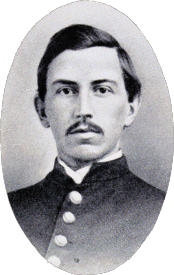(April 26)
At 6 P. M. of the 25th we fell in, and to the music of the drums and fifes, began our first real march; we stepped out at a brisk pace, full of enthusiasm, thoroughly rested, and ready for anything required of us; reports of the close proximity of the enemy were abundant, which kept us well closed up throughout the day, and after dark, the rockets and blue lights discharged in various directions stimulated us to constant and renewed exertions. These signs of hostilities greatly interested us, and made us think we were already in an enemy’s country. About midnight we suddenly came upon a brilliant scene, being a bivouac of the First and Second Rhode Island regiments. There were more than a hundred fires burning, and the picturesque groups sitting around them gave us a delightful little view of campaigning most unexpectedly. The Rhode Islanders cheered us heartily, and as soon as we halted, invited us to share their hot coffee, which we were not slow to do.
We rested here over an hour, the Rhode Islanders preceding us by about an hour; we were greatly fatigued, as the roads were very heavy, being knee-deep in sand, and were loath to move forward again, but it had to be done, and footsore and weary, valises and bundles in one hand, guns in the other, we started off again, to march the remainder of the thirty miles. Many of the fellows lightened their burdens by throwing away some of their things, their views of the necessities of military life undergoing very serious changes as they encountered the hardships of campaigning. I was sorely tempted to throw away something myself, but held on to the end, although greatly exhausted.
The night was dark but fine, and as soon as we got warmed up again, we stepped out at a lively gait, smoking, telling stories, and helping each other; about two o’clock a couple of rockets were suddenly discharged almost directly in front of us; the regiment was halted, and a company deployed as skirmishers, while the remainder formed in hollow square by the roadside. It was rumored there were a couple of rebel cavalry regiments in the neighborhood, and we supposed they were probably going to attack us. As soon as the square was formed, the men were told to sit down, arms in hands, and there we sat in perfect silence, while the skirmish line advanced to discover the enemy. We talked in whispers, gave each other our home address in case of accident, then quietly awaited results. All of a sudden a strong beautiful tenor voice broke the silence, singing, “Vive l’ America.” It was Pendergast, a noted professional singer, and was indeed exquisite, rendered unusually so, of course, by the surroundings. It was strange, romantic, and delightful, and I know I shall always remember it most distinctly. After nearly an hour’s delay, the company ahead reported the coast clear, so we fell in and resumed the march. One of the funny things about this march was the depressing responses of the natives to our frequent inquiries as to the distance to the junction, the invariable replies being nine miles, and it began to look as though that nine miles was interminable. At last, just about the dawn of day, we reached the little station and village known as the junction, closed up the ranks, stacked arms, and lay right down in the street, and fell fast asleep.
About seven o’clock we were on the alert again, and quickly transformed the nice rail fences into roaring camp-fires, around which we prepared our coffee and ate our breakfast. Afterwards we went foraging, capturing chickens, ducks, pigeons, and whatever was eatable, and had lots of fun; as the government had not provided us with anything to eat here, we were obliged to help ourselves or fast, and under such circumstances we did not hesitate. The natives protested in vain; hungry soldiers must eat, and if the government cannot provide, the country must do so, and the people will be obliged to charge up their losses to the calamity of war.
We remained all day and quite recovered from our thirty-mile march. About five P. M. a long train of cattle-cars came in from Washington, to which we were promptly transferred, and arrived at our journey’s end, Washington, about six o’clock the following morning, marching directly to the navy yard, where quarters were already prepared for us.
